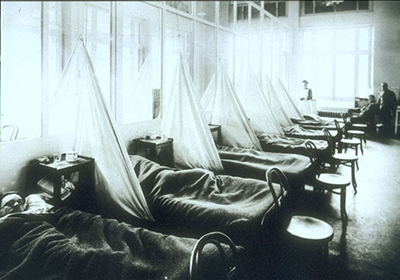 Victims of the Spanish flu at a U.S. Army Camp Hospital in Aix-les-Bains, France, in 1918
The 1918 influenza pandemic (also called ‘Spanish flu’) infected 500 million people around the world and resulted in the deaths of three to five percent of the world’s population. It was one of the deadliest natural disasters in human history.
Victims of the Spanish flu at a U.S. Army Camp Hospital in Aix-les-Bains, France, in 1918
The 1918 influenza pandemic (also called ‘Spanish flu’) infected 500 million people around the world and resulted in the deaths of three to five percent of the world’s population. It was one of the deadliest natural disasters in human history.
Hypotheses about the source of the flu have varied but investigative work by virologist John Oxford and his team identified one of the camps on the Western Front as being at the centre of the flu outbreak. So how significant was the influenza outbreak on the casualties at the end of the First World War?
“In the American Army it was hugely significant. I mean more American soldiers died of the influenza than died from German action.” Says Professor John Oxford, a virologist and expert on influenza.
He believes the outbreak of flu it began in the Army camps on the Western Front; the biggest one being Etaples. “They had everything there that we now know could engender a new virus, a new bird virus to appear. And it was a bird virus, it was overflown by migrating ducks and geese, and we now know that those animals, those birds carry these viruses.”
Nowadays we know the flu was a bird virus, a strain called H1NI but what did they know about the epidemic 100 years ago when medicine wasn’t as advanced?
Professor Oxford thinks the first indications think they had was in the Royal Army Medical Corps, 1916, in the great camp at Etaples. “They were worried, they’d always been worried about infection in the First World War because in every previous war more soldiers had died of infection than had died of bullets or shell wounds. But the First World War they seemed to have got away with it up until 1916, and then suddenly in Etaples and Aldershot Barracks the soldiers began to die in the camps of a respiratory infection. That really got the alarm bells ringing.”
Nurses helping the soldiers dying of influenza realised they were at chance level of catching the flu and dying so they put in some effort to contain it. This included:
- Using masks
- Social distancing
- Hand washing
“They could do quite a lot... They (the nurses) did not make a run for it. So they were putting effort in I think to try and contain it. They used masks, they tried to do a bit of social distancing, you know, move yourself away, but if you’re nursing someone how can you do that. They had to get pretty close. And they used hygiene. Wash your hands. And we now know scientifically those three things can have some effect.”
The war was the ideal breeding ground in which the flu could spread due to the close living quarters, massive troop movements and the weakened immune systems of the soldiers because of malnourishment and stress. However, this wasn’t limited to the Western Front, in fact the Armistice on 11 November 1918 gave the virus an opportunity to spread further.
Professor Oxford explains, “They (the soldiers) were all going home from the Western Front and they were unfortunately carrying these viruses with them, and they would go to every spot of the British Empire. They went home, their parents would call a little party, their son had come home from the War, bring in the neighbours from ten miles around, get in there and get infected and they’d die. That was the biggest outbreak.”
This article was taken from an interview Death on the eve of the Armistice, from the episode The Last Day of World War One in the BBC/OU co-production 'Timewatch'.




Rate and Review
Rate this article
Review this article
Log into OpenLearn to leave reviews and join in the conversation.
Article reviews